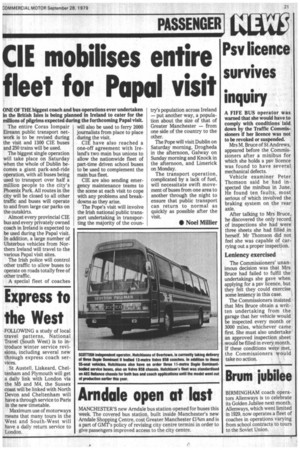CIE mobilises entire
Page 23

If you've noticed an error in this article please click here to report it so we can fix it.
fleet for Papal visit ONE OF THE biggest coach and bus operations ever undertaken in the British Isles is being planned in Ireland to cater for the millions of pilgrims expected during the forthcoming Papal visit.
The entire Coras Iompair Eireann public transport network is to be revised during the visit and 1300 CIE buses and 250 trains will be used.
The biggest single operation will take place on Saturday when the whole of Dublin becomes a giant park-and-ride operation, with all buses being used to transport over half a million people to the city's Phoenix Park. All routes in the city will be closed to all other traffic and buses will operate to and from large car parks on the outskirts.
Almost every provincial CIE bus and every privately owned coach in Ireland is expected to be used during the Papal visit. In addition, a large number of Ulsterbus vehicles from Northern Ireland will travel to the various Papal visit sites.
The Irish police will control other traffic to allow buses to operate on roads totally free of other traffic.
A special fleet of coaches will also be used to ferry 2000 journalists from place to place during the visit.
CIE have also reached a one-off agreement with Ireland's two main bus unions to allow the nationwide fleet of part-time driven school buses to be used to complement the main bus fleet.
CIE are also sending emergency maintenance teams to the scene at each visit to cope with any problems and breakdowns as they arise.
The Pope's visit will involve the Irish national public transport undertaking in transporting the majority of the coun try's population across Ireland — put another way, a population about the size of that of Greater Manchester — from one side of the country to the other.
The Pope will visit Dublin on Saturday morning, Drogheda in the afternoon, Galway on Sunday morning and Knock in the afternoon, and Limerick on Monday.
The transport operation, complicated by a lack of fuel, will necessitate swift movement of buses from one area to another through the night to ensure that public transport can return to normal as quickly as possible after the visit.
• Noel Millier




























































































































































